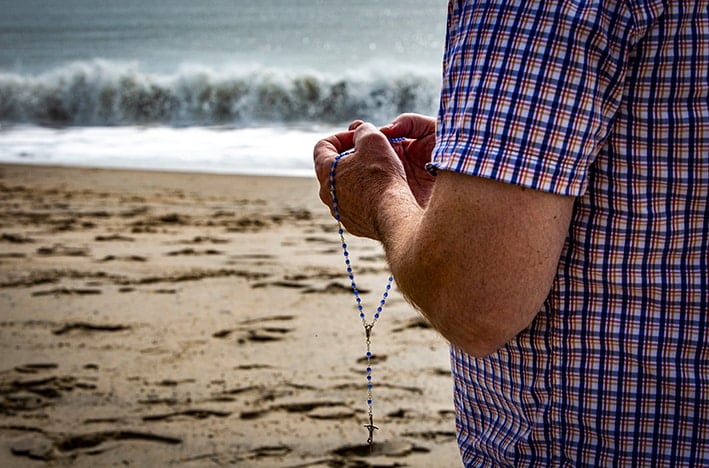بيان مجلس الامن ذكر باعلان بعبدا والجميع هنا يبتعد عن الخوض في الموضوع من* *السياسيين الى الإعلام لعدم المس بمشاعر الحزب* *لن …

By Fr Danny Nouh -- Devotion to Our Lady and praying her Rosary are non-negotiable aspects of the Maronite way In a year that most of us have often wished away thanks to the pandemic and its impacts, I want to pause and reflect on a beautiful juncture in our spiritual journey. We have just arrived at a month that every year I wish would never end; the month of the Most Holy Rosary, the month of October. My prayer is that the challenges we have faced this year have led us to the Rosary more and have helped us to come to understand the graces that we can receive through this devotion. We Maronites are predominantly a people of faith and prayer. For the Maronite Church, the Liturgy is our primary source of spirituality, inspiration and theology. Whereas the Western Church relies heavily on the writings of the Great Fathers who explain to us the Scriptural, Traditional and Dogmatic understanding of our faith, the Maronites take a spiritual understanding inspired by the prayers and hymns of saints and hermits, the blood of our martyrs and the everyday witness of our mothers and fathers.
This prayerfulness or spirituality has been handed down from Saint Maroun and his disciples through the generations and it stems from the monastic and ascetic life that they lived; this we have adapted without even knowing, in our ordinary, everyday life. As such the Rosary has naturally become the most important form of prayer after the Divine Liturgy. While we all know the origins of the rosary are not Maronite, it is said that the Arabic word for the Rosary is believed to have originated in a pagan or Muslim form in the East: “massbahat”. Today we all know it as Massabha (the word for Rosary in Arabic), which simply means to give praise.
:quality(70)/cloudfront-eu-central-1.images.arcpublishing.com/thenational/JSX7GUV47JDPBB2GV65P5YAZVE.jpg)
Therese Comair explains the difficulties facing Lebanese people from her clinic
By Sunniva Rose -- thenationalnews.com -- Therese Comair likes to talk about herself in the third person. “Therese is clever and hard-working,” she said when explaining how the ministry of health granted her a permit to continue running her village’s clinic despite retiring three years ago. “Therese serves everyone, whatever party or religion,” she said, sitting in her cousin’s living room overlooking the dramatic mountain scenery surrounding the picturesque village of Tannourine, an hour-and-a-half’s drive north-east of Beirut. “A sick man is a sick man.” Most people in Tannourine, a historic Maronite Christian refuge close to 1,500 metres above sea level with a natural reserve of Lebanon’s famed cedar trees and deep waterfalls near by, agree with Therese. “She’s not like any other employee who goes home after their shift. She’ll come out in her pyjamas to get medicine for you,” said Norma Younes, a retired schoolteacher.
For the tight-knit community of Tannourine, Therese, a short, energetic 67-year-old woman with bright blue eyes, has come to embody the local government-owned primary healthcare centre, where she has worked as a nurse and midwife for nearly 50 years. Though she retired in 2018, she stayed on as a volunteer, backed by the local government hospital and the municipality that provides her with a small monthly stipend. Villagers feared no one would replace Therese because of a government hiring freeze and the centre would close. Today, they rely on her services more than ever. Patients have tripled in the past two years as Lebanon’s devastating financial crisis drags on, according to Therese, who manages her stocks carefully. People have started calling from outside the village, as far away as Batroun, a coastal town a 45-minute drive away. “I can’t give everything to one person in one go,” she said as she listens to a voice note on WhatsApp from a man asking for a second dose of an antibiotic, Augmentin, for his baby, a few hours after a first request that morning.
By Trevor Filseth – nationalinterest.org — In a letter to Secretary of State Antony Blinken, Rep. Gregory W. Meeks (D-NY), Chairman of …
Khazen History


Historical Feature:
Churches and Monasteries of the Khazen family

St. Anthony of Padua Church in Ballouneh
Mar Abda Church in Bakaatit Kanaan
Saint Michael Church in Bkaatouta
Saint Therese Church in Qolayaat
Saint Simeon Stylites (مار سمعان العامودي) Church In Ajaltoun
Virgin Mary Church (سيدة المعونات) in Sheilé
Assumption of Mary Church in Ballouneh
1 - The sword of the Maronite Prince
2 - LES KHAZEN CONSULS DE FRANCE
3 - LES MARONITES & LES KHAZEN
4 - LES MAAN & LES KHAZEN
5 - ORIGINE DE LA FAMILLE
Population Movements to Keserwan - The Khazens and The Maans
ما جاء عن الثورة في المقاطعة الكسروانية
ثورة أهالي كسروان على المشايخ الخوازنة وأسبابها
Origins of the "Prince of Maronite" Title
Growing diversity: the Khazin sheiks and the clergy in the first decades of the 18th century
Historical Members:
Barbar Beik El Khazen [English]
Patriach Toubia Kaiss El Khazen(Biography & Life Part1 Part2) (Arabic)
Patriach Youssef Dargham El Khazen (Cont'd)
Cheikh Bishara Jafal El Khazen
Patriarch Youssef Raji El Khazen
The Martyrs Cheikh Philippe & Cheikh Farid El Khazen
Cheikh Nawfal El Khazen (Consul De France)
Cheikh Hossun El Khazen (Consul De France)
Cheikh Abou-Nawfal El Khazen (Consul De France)
Cheikh Francis Abee Nader & his son Yousef
Cheikh Abou-Kanso El Khazen (Consul De France)
Cheikh Abou Nader El Khazen
Cheikh Chafic El Khazen
Cheikh Keserwan El Khazen
Cheikh Serhal El Khazen [English]
Cheikh Rafiq El Khazen [English]
Cheikh Hanna El Khazen
Cheikha Arzi El Khazen
Marie El Khazen